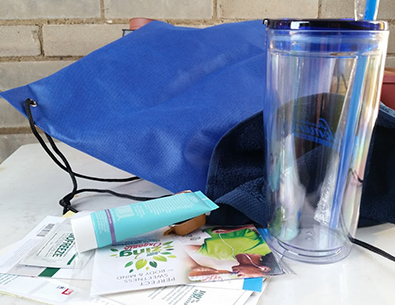When considering the three Rs, reducing your waste in the first place before reusing and recycling is the most important step you can take to being more environmentally friendly. But unfortunately, it’s often the hardest one to accomplish. Although it does take some self-control and planning, it can be done. A good first step toward lowering your waste is refusing items you don’t need.
Consider the costs of “freebies”
“Freebies,” “swag,” or “giveaways” are usually small, innocent items given to you at a fair, conference, event, or in daily life. It’s typically something used for promoting a business or as a reward. Maybe you spun the wheel and won a pair of sunglasses. Of you got a towel at the sports game to cheer on your team. Accepted without much thought, these items add to clutter in your home and are most likely thrown in the trash before long.
Learning to refuse
Think of some of the items you’ve been handed or picked up lately. Some common ones may include:
- Pens and pencils
- Toys and trinkets (key chains, Frisbees, stress balls, cell phone accessories)
- Reusable bags or water bottles (Are they high quality? Do you really need another one?)
- T-shirts and handkerchiefs
- Flyers or handouts
Sometimes you take these items with good intentions to use them. Other times you don’t even want them, but they seem forced upon you. Even if you can recycle or compost your freebie, it doesn’t make sense to accept it just to throw it out!
Refusing (soon-to-be) waste requires a mindset shift – try to think ahead instead of just in the moment. Ask yourself these questions when presented with a freebie:
- Is it useful? And will I actually use it?
- Will I still want this in a month or two? Will it last that long?
- Will I regret it later if I don’t take this?
If the answer is no to any of these questions, respond with a “no thank you!” and keep on moving. You won’t hurt anyone’s feelings. If the swag is prepared for you in advance, like a race bag, consider emailing the event organizers to let them know you’d like an option next time.
Make a habit of acting on your values. Being intentional about what you consume is a part of living a lower-waste lifestyle, and learning to say “no” is an important step.

